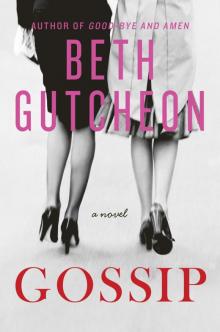- Home
- Beth Gutcheon
Leeway Cottage Page 27
Leeway Cottage Read online
Page 27
“Not at all,” said Sydney. “He keeps his apartment in town. He can be there as much as he needs to be. But he says he had enough of being away from home all those years during the war. He says he decided then that what he wanted from life was a happy family.”
The war years. The women nodded. The war explained most things they didn’t understand about their husbands. It was a mystery box in the back of their mental closets, into which they put all kinds of things. “It must be so interesting, being married to an artist.”
“Yes,” said Sydney. Being married to an artist meant having a husband who can be looking right at you and yet be a thousand miles away, playing through that moody adagio in his brain while you’re talking to him, but there was no point explaining it. Being married to an artist meant having the bedside light go on at two A.M., and when the next morning you read what he has scrawled, hoping for a revealing dream or a reminder to take the car for an oil change, you found “Presto! not Allegro! 3d movement, to the repeat.”
“So…performing? He just gave that up?” Peg asked.
Was there a needle concealed somewhere in the folds of this question? That she’d been selfish in making her husband move to the country? Sydney could spot criticism of herself the way an X-ray machine sees through flesh.
“He performs more than he wants to,” said Sydney, lighting a cigarette. “He prefers the preparation. He’s preparing some Lukas Foss right now and he’s happy as a clam, even though it sounds like a tray of dishes being dropped down the stairs. And he loves his students here, they’re so grateful to work with someone of his caliber. He has a private student right here as good as anyone at Mannes. Your deal, partner,” she added to their pregnant companion, who sank back into her chair and took up the deck.
“My husband is going to ask Laurus to join the board of the YMCA,” said Peg as the cards were served around. “Don’t tell him I told you.” Peg’s husband was one of those men who was at the center of things no matter where he was. He did something on Wall Street, and practically owned Nantucket.
Sydney, thrilled, rushed home to tell Laurus immediately. She felt she’d won a long and difficult campaign. “When George Barker asks you to join his board, you know you’ve arrived.”
“I’m glad to hear that,” Laurus said gravely. “I wouldn’t want to fall out of the train before we got to the station.”
She looked at him to see if this was a joke, or what. It probably was. Danes were always joking.
When Jimmy was eight, the fact that he still couldn’t read “Jump, Spot!” was beginning to be more important than his being a musical prodigy. You could go a long way in this world without playing Rachmaninoff, but you couldn’t get far if you couldn’t read.
In fact, a strange thing had developed from Jimmy’s unusual gift. Rather than making him feel specially blessed, it had made him furious. Music came to him the way water falling over a cliff becomes a waterfall, and it no longer interested Jimmy, any more than the waterfall interests the cliff. He’d rather have been eight feet tall, or strong as Superman, or able to fly. Of course he wanted to be special, he wanted to be admired and feared, but he didn’t want to sit all day in goddam school, where even ordinary difficulty in learning new things seemed to him like trudging in lead boots through hot tar. He’d had the experience of being born knowing, and he thought all learning should be like that. At least for him.
“He is one of the youngest in the class,” said Mr. Blodgett, the headmaster of their little Country Day School. Mr. Blodgett sat behind his big desk and Jimmy’s teacher sat on a chair positioned as if she were ready to dive for cover if Mrs. Moss opened fire.
Sydney sat spinning the diamond she wore with her wedding ring around and around her finger. She had not expected ever to be told a child of hers should be held back, and she wasn’t pleased. She had just spent the best part of the spring organizing a Parents Talent Show for this school. She’d been in the building every day for weeks, no one could have mentioned there was a problem?
“And he’s a little small for his age. We think it would do him good to be a social leader. He’d have an advantage in sports too.” Oh, did he need one? He was a spaz as well as a retard? Mr. Blodgett could see That Look in Mrs. Moss’s eyes.
“This child is a prodigy,” said Sydney, her voice alarmingly soft.
“He certainly is, at the piano. Quite amazing,” said Mr. Blodgett. “Maybe we should just go over some of his math and reading homework, though, to give you an idea.”
Laurus looked it all over quietly. He was a source of great curiosity to the teachers. In the faculty room it was said that Sydney and Laurus Moss were like a tiger and a zebra married to each other. What were those two doing together? Did Mr. Moss even know what his wife was like with people who couldn’t defend themselves? One of the teachers who had Jimmy in kindergarten had taken to telling homeroom teachers to be sure to keep a raw chicken to toss at her if Mrs. Moss started to pace at parent conferences.
Laurus asked some questions. He noticed that when Jimmy wrote anything at all, he used the space on the page very strangely, cramping his numbers together in odd places instead of on the lines provided, as if the empty sheet looked like a minefield to him and he were forced to compress himself around the edges to avoid something fearful.
Mr. Blodgett agreed it was odd. He had no idea what if anything it meant, except that Jimmy had learned bung-all about arithmetic this year and would be in worse shape if they passed him to the Green Level and he had to do long division.
Sydney and Laurus left this meeting in separate cars, as he had a lesson to give and she had a golf match. As she wound through the leafy byways to the club, rich with the emerald green of early summer and the smell of moist earth, she thought about having to tell all her cheery pals her son had been left back. And Jimmy himself would be shamed and furious, she expected, and have to make all new younger friends. There are no stupid people on Laurus’s side, none. I suppose these dumb genes are supposed to be from my family. And they probably are, too. Goddam Candace.
That night they broke the news to Jimmy, who looked at his sneakers and said not a word while Sydney cooed the news to him. Then he went down to the playroom and colored all over the pages of Monica’s treasured copy of King of the Wind. Sydney made all Jimmy’s favorite food for supper, as if it were his birthday, lamb chops and mashed potatoes and floating island. Later when Monica appeared in the doorway of the den weeping, with her spoiled book in her hand, Jimmy burst in after her crying angrily, “It was an accident!”
Monica, too enraged to speak, turned the pages, holding the book toward her mother. The Godolphin Arabian’s noble eyes, his delicate flared nostrils, had been ferociously scarred with orange and purple attack weapons.
“Oh, leave your brother alone, Monica, he’s had a bad day.”
A strangling cry for justice rose from her throat.
“I said leave him alone, Monica!” Sydney snapped. “Act your age!”
After a stunned moment, both children stomped out of the room. Monica, who had never, that she could remember, been either the oldest or youngest, wanted to kill somebody when she heard that particular phrase. Whatever age she was supposed to act was not ever the age it was convenient to be.
Afterward, left alone together in the pine-paneled den lined with book sets and stacks of American Heritage magazine, Sydney saw that Laurus was looking at her, with that mild expression that meant he was thinking things he would rather not say out loud. As if he were wondering, “Who are you?”
She did not want to talk about it. She knew it wasn’t fair, but when she looked at those two stormy faces, her differently loved children before her, it was as if some vast desire took over her brain and did what it wanted, blotting out reason. It was the way she was, there was no point in revisiting the moment now that it had passed.
“They’ll both have forgotten it in the morning,” she said, with a dismissive wave of one hand.
THE LEEWAY COTTA
GE GUEST BOOK
July 2, 1956
Jimmy and I drove up last night, wrote Sydney, and had first-night dinner with the Cranes as always. Gorgeous weather and everything looks the same. Ellen Chatto is living in this year. She is having an ugly divorce and she feels safer here. Eleanor is at summer camp and Laurus has taken Monica to Denmark. Al from Plumbing and Heating tells me that something fell in the well and died, so we’re filling jugs from the town pump for drinking water at the moment. Lovely to be here.
Jimmy stayed home with Ellen the next night while Sydney went to dinner at The Elms. Her mother was in rare form and Bernard was better than he’d been in years. The doctors had made him stop smoking, which he hated. “And he was a beast the whole time,” said Candace, spooning her soup. “Weren’t you, darling.”
“I thought I behaved very well,” said Bernard.
“You’re lucky you have any friends left at all,” said Candace, and the Maitlands laughed. Sydney looked up surprised, and noticed something that had eluded her. Her mother and Bernard actually loved each other. How, she couldn’t imagine.
“Now tell us all your news, darling,” said Candace. She had a way of turning the attention to Sydney at the exact moment that she had a plate of hot food in front of her and wanted to be left alone to eat. Sydney looked with regret at the delicious-looking pile of lobster Newburg she’d just dumped onto her plate, and rose to the bait.
“Laurus has taken home leave,” she said. “Monica went with him, to spend the month at the beach with her grandparents.” She deliberately said this as if her children only had one proper set of grandparents.
“And Eleanor?”
Bernard’s adoration of Eleanor was undimmed by the fact that she was growing pudgy hips and breasts and a fascination with hair-styles.
“She’s at that age,” said Sydney. “Too old for camp really, too young for a job. She’ll do one month at camp with her best friend, as CITs, and then they’ll both come up for August.”
“And Jimmy?”
“Most adorable-looking little boy…” put in Mrs. Maitland, chewing.
“You know, he was an April baby. One of the youngest in his class and he’s small, too. We thought, you know, what is the rush here? Let’s hold him back for the class he probably should have been in all along, and let him be the oldest and one of the biggest. Fortunately, the school thought we were absolutely right.”
A brief silence.
“And is he happy about it?”
“Jimmy? Oh sure, he’s the Go-along-get-along Kid.” Having dispatched the subject with this spectacular piece of misinformation, she addressed herself to her cooling Newburg, which was beginning to look like library paste.
It was Amelia Crane, Gladdy’s daughter, who began tearfully referring to Jimmy Moss as “Crash,” because his way of barging at the start of a sailing race, or disputing buoy room, was to yell ferociously at the boat he was fouling and ram it if it didn’t yield. Other boats protested him race after race, and he usually lost, but it didn’t make the other children feel better. Sydney contended he was just learning to be a good, aggressive little competitor, but by the end of July, half the yacht club was referring to her son as “Crash” and she held it against young Amelia. It was said by some that Sydney had in semiprivate remarked that Amelia Crane had always been a whiner. If Gladdy heard it, she never ever treated her friend with anything but steady, cheerful affection. In later years it seemed completely forgotten, but there was a time that summer when there was a certain strain in the friendship.
THE LEEWAY COTTAGE GUEST BOOK
We have had a splendid visit. Barring only the famous absence of cloudberries, we felt completely at home. The view from Butter Hill is gorgeous; we look forward to next year!
—Per Bennike
—And we hope you will visit us someday in Hornbæk! With warmest thanks for a delightful week—
—Britt-Marie Bennike
Aug. 16, 1956
In the margins, Britt-Marie had drawn a beautiful picture of the bald eagle they had seen in flight over the bay while sailing one afternoon. She also drew a little family of harbor seals sunning themselves on Tide Rock.
Per and Britt-Marie were Sydney’s idea of perfect houseguests. They spoke perfect English, they entertained themselves all day, Per sailed expertly, and Britt-Marie played good tennis. Further, they were good company when carried off to a picnic or dinner with a lot of Sydney’s lifelong friends who happily laughed and teased and gossiped among themselves as they had every summer since they were children, treating outsiders exactly as they treated each other, as if guests were bound to enjoy immersion in their own narrow summer world, but also as if they had known these newcomers since childhood and fully expected to know them for the rest of their lives.
It was not every visitor who enjoyed this treatment. Some felt it skipped several stages of formality that upset the natural order and robbed the shy or reserved of necessary decorum, others that it was bloody boring to be expected to take an interest in who was related to whom and oft-told tales about eccentric characters or comic events from the dim past. But some felt there was nothing more fun than a place at the table where food, affection, high spirits, and goodwill abounded and all you needed was enjoyment of a joke and a reasonable sense of self-deprecation to be wholly welcome. Per and Britt-Marie fit right in. Per was handsome with a dry, Laurus-like sense of humor. Britt-Marie won herself many fans by being smart and funny and rather dumpy.
At their first Dundee dinner party, Britt-Marie announced firmly that there was a ghost in the guest wing at Leeway. Sydney denied it; Britt-Marie insisted. It flushed the toilet in the middle of the night when she was in bed and Per was beside her and everyone else was upstairs. It smoked cigars outside her window and it rearranged her books. And it spoke Swedish. It was only the Swedish books that it took an interest in.
“Isn’t it scary, though?” asked Lucie Cochran Maitland.
“No, of course it isn’t scary. It’s not as if it spoke German,” she said. There were roars of laughter, and the talk turned, as it so often did, to Dundee history. Someone always told the story of the house around the other side of the bay that had once been out on Beal Island, that had a ghost so angry and frightening that the owners gave it to the Dundee fire department, who burned it down.
“Really! A perfectly good house?”
“Laurus was with them,” said Sydney.
“You were?”
“No I wasn’t, it was before I joined. But Mutt Dodge was. He swears that when the house was engulfed he saw a figure inside, at the upstairs window, trying to get out. He almost had to quit fire-fighting he was so upset.”
“And there was no one there.”
“No, of course. They had searched every inch of the house beforehand. And they searched the ashes afterward.”
“Ooooo, creepy,” someone always said, delighted.
Per and Britt-Marie had met in Stockholm during the war. She teased him charmingly about how it had taken him six years to come courting her. “Holding a torch for someone else, I think…”she would say.
“No, just stupid,” Per always replied.
Britt-Marie was posted to the Swedish delegation at the U.N. Per had had two novels published in Denmark and was at work on a third, writing in English. They said they loved New York.
“Americans are so welcoming. Very accepting,” Per said.
This delighted the Americans, since it was a nice thing to say and also just what they thought themselves. Sydney insisted on introducing Per as “our friend Per I’m-No-Hero Bennike”; she had told all about the part he’d played in rescuing Laurus’s parents, but if anyone mentioned it, he brushed it aside. At a party toward the end of their visit, Ned Maitland called down the table to Per, “All right, you Danes, let’s have it, it’s time. We want to know how you saved the Jews, without being heroes.”
Per looked across the table at Laurus.
“There has to be an answer,” said Elise.
“What is it about Denmark?”
“There is an answer,” Britt-Marie said, clearly implying that if the Danes were too modest to talk about it, a Swede wasn’t.
“Denmark is a small country…” said Per, and was surprised when everyone laughed. One of Sydney’s routines was that when you asked a Dane anything, he started by saying that Denmark is a small country.
“Well, it is,” Laurus put in. “It’s small and there are national traits. Danes love peace. And they love comfort, and they’ll sacrifice a lot for them. But they cannot enjoy peace and comfort while behaving badly. Also, they have great respect for each other. They trust each other to behave. So when they saw that they had to, they all acted the same way out of simple pride, and assumed their fellow Danes would do the same.”
“It was a matter of self-respect. Their sense of their own identity,” added Per I’m-No-Hero.
“If that isn’t the most Danish thing you ever heard in your life…” said Sydney.
When Gladdy and Neville were brushing their teeth that night, she said, “Weren’t you interested in what Laurus said tonight?” She was wearing an old pair of Neville’s pajamas. The bathroom, wainscotted with layers of white paint chipping in places, showing the original ancient blue beneath, smelled of soap.
“I was,” said Neville. “What did you think?” She rinsed her mouth but did not move away from the basin.
“What I was thinking,” Gladdy said, “was that I finally understood that marriage.” Their eyes met in the mirror for a moment before she turned, touching him fondly on the butt, as he stepped to the sink and she left the room.
Laurus enjoyed the Bennikes’ visit very much. On rainy days, he and Britt-Marie would go through the upstairs shelves and cabinets of Leeway looking for Swedish artifacts left by the Eggerses. They found many works of Emmanuel Swedenborg; someone in the family must have been a devotee. Britt-Marie’s favorite uncle was Sweden-borgian. The more she talked about it, the more interested Laurus became, and the more (she claimed) the cigar-smoking phantom would leave olfactory signs of his presence, which, she added, was palpably benign. This disappointed young Jimmy of course, who would have preferred blood and guts and rattling chains in the spare rooms.

 The Affliction
The Affliction Dead at Breakfast
Dead at Breakfast Good-bye and Amen
Good-bye and Amen Leeway Cottage
Leeway Cottage Gossip
Gossip Saying Grace
Saying Grace